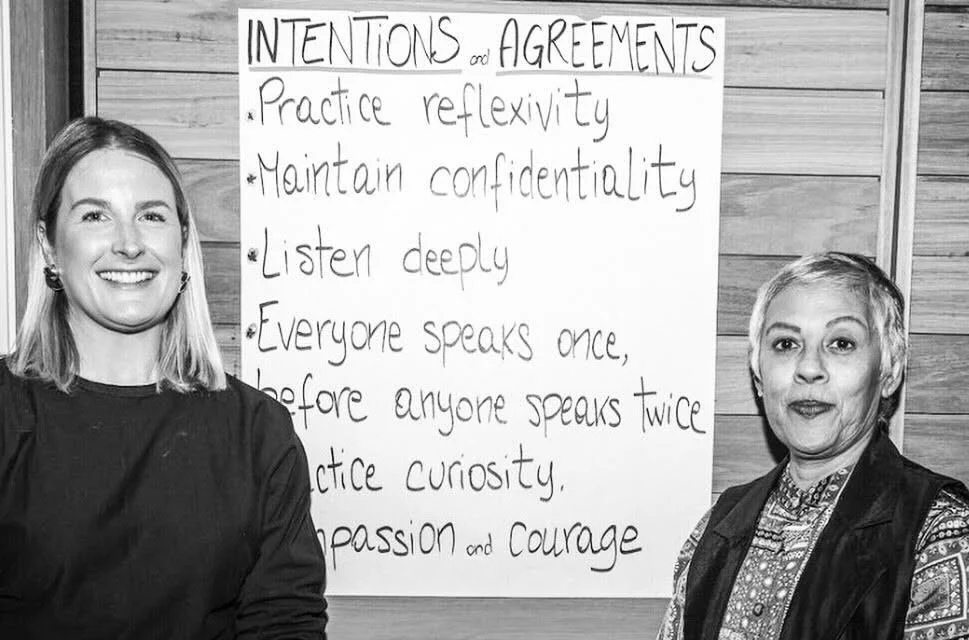At Next25, our mission is to ensure Australia has what it takes to make the future its people want. As an independent think-and-do tank, we combine rigorous research, trusted engagement, and innovative initiatives to uncover and address the deep contributing factors of Australia’s most pressing issues. Our recent participation in the Impact Institute’s Social Impact Summit was an opportunity to demonstrate our think-to-do model, through our “Constructive Conversations” keynote and engagement exercise led by our CEO, Chloë Spackman, with support from Senior Facilitator and Coach Renu Burr.
Think-and-Do
Our methodology bridges the gap between research and action, ensuring that our findings translate into practical, impactful initiatives. Working towards systems transformation, we seek interventions that will have an outsized influence on effecting positive change for Australia’s future. Through listening and observing, developing, testing, and iterating, we arrive at methods that provide us with new insight into complex challenges.
Research Insights
Australia is a rich country that has walked into trouble across economic, environmental, and social issues. And, when things get tough, we need to talk. But, as Next25's research shows, Australia finds it hard to constructively discuss contested issues, which is a key contributor to the country’s underperformance.
Our research into constructive discussions reveals several key barriers. Modern discourse often becomes trapped within echo chambers, exacerbated by polarising rhetoric that divides rather than unites. The media, playing a significant role in shaping public discourse, frequently fuels conflict and provides superficial coverage, detracting from meaningful conversations. Engaging in constructive dialogue also involves navigating various emotional and social risks, which can either foster connection or shut down discussions. Necessary elements of discomfort and confrontation are often avoided, leading to superficial agreements rather than deep understanding. Furthermore, access to meaningful discussions is frequently restricted, leaving many to feel excluded from the dialogue. Read more about these findings in our paper, Contested spaces: Australia, the referendum, and constructive discussion.
These barriers highlight the importance of creating spaces where individuals can engage in open, honest, and reflective conversations. As noted by the Impact Institute, the keynote from Chloë Spackman revealed not only the barriers to a cohesive society but also the power of sitting with discomfort rather than running from it, a sentiment echoed by Craig Foster AM.
Practical Application: The Case Clinic
To put our research into practice and give the audience an immediate experience of a constructive discussion, we conducted a Case Clinic exercise during the Summit, adapted by the Presencing Institute from MITx u.lab. This exercise was structured to foster open, reflective dialogue and included several key steps:
Check-In Questions: Allowing each person to fully arrive in the group, and setting the stage for respectful, open and generative discussion.
Intention Statement: The case giver presents a current, concrete challenge, outlining their aspirations and learning thresholds.
Stillness and Silence: Participants reflect on what they’ve heard, connecting with their hearts and minds.
Mirroring: Learning partners share images, metaphors, and feelings evoked by the case giver’s story.
Generative Dialogue: A collaborative discussion builds on each other’s ideas without pressure to solve or “fix” the challenge.
Closing Remarks: Final reflections from learning partners and the case giver.
Individual Journaling: Capturing personal learning and reflections on their experience of a constructive conversation.
This exercise illustrated the practical application of our research and provided valuable insights into the barriers and enablers of constructive discussions.
Think-and-Do Case Study: Constructive conversations supporting system transformation in NSW Parliament
Next25’s work in fostering constructive conversations has been instrumental in bridging divides and fostering collaboration among women MPs across party lines through the Improving Democracy: Transforming Parliament for Women program. By creating safe spaces for open, empathetic, and respectful dialogue, we’ve enabled participants to share experiences, build trust, and find common ground. This approach has empowered women to collaboratively address systemic challenges, fostering a culture of mutual support and collective problem-solving.
The word cloud below reflects how participants will approach constructive conversations in future, reflecting their commitment to pause and adopt more curious, mindful, empathetic, and open approaches to dialogue.
The participant feedback underscored the transformative potential of connecting with others on a human level rather than through a curated persona. It demonstrated the value of creating intentional spaces for genuine exchange and the need for ongoing reflection and adaptation in our conversational practices.
What’s next?
We have been collaborating with the UTS Transdisciplinary School on Constructive Discussion through the lens of the Sydney Housing Challenge. Watch this recent Next25 webinar for key insights into transdisciplinary collaboration, the four spheres of constructive discussion, and their real-world application. Sign up to our mailing list to keep up to date with our work as we once again move from think to do and begin to design and test interventions.







